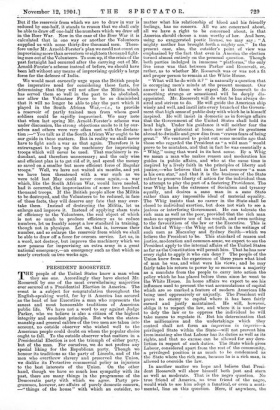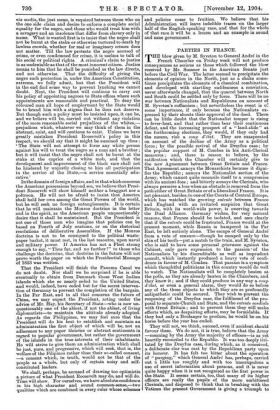T HE people of the United States know a man when
they see one. Accordingly they have elected Mr. Roosevelt by one of the most overwhelming majorities ever secured at a, Presidential Election in America. The event is a ,subject for congratulation throughout the English-speaking world, for by it America has secured as the head of her Executive a man who represents the sanest and most honourable traditions of American public life. We have not a word to say against Judge Parker, who we believe is also a citizen of the highest integrity and soundest principle. But when the states- manship and general calibre of the two men are taken into account, no outside observer who wished well to the American people could doubt on whom the popular choice ought to fall. To the outside observer what matters in a Presidential Election is not the triumph of either party, but of the man. For ourselves, we do not profess any special liking for the Republican party. Though we honour its traditions as the party of Lincoln, and of the men who overthrew slavery and preserved the Union, we dislike its Protective commercial policy as injurious to the best interests of the Union. On the other hand, though we have so much less sympathy with its past, there are many things in the programme of the Democratic party with which we agree. Party pro- grammes, however, are affairs of purely domestic concern, —" things of the house " with 'which an outsider, no matter what his relationship of blood and his friendly feelings, has no concern. All we are concerned about, all we have a right to be concerned about, is that America should choose a man worthy of her. And here, using no exaggerated poetic license, we may say : " A mighty mother has brought forth a mighty son." In the present case, also, the outsider's point of view was emphasised by the fact that even in America the election turned almost entirely on the personal question. Though both parties indulged in immense " platforms," the only live issue was that between Parker and Roosevelt, or, rather, as to whether Mr. Roosevelt was or was not a fit and proper person to remain at the White House.
" What will he do with it ? " is naturally a question that is occupying men's minds at the present moment. Our answer is that those who expect Mr. Roosevelt to do something strange or sensational will be deeply dis- appointed. Mr. Roosevelt will do what he has always de- sired and striven to do. He will guide the American ship wisely and well, and instil into every branch of the Govern- ment that high sense of public duty with which he is himself inspired. He will insist in domestic as in foreign affairs that the Government of the United States shall hold its head high. Under his guidance it will neither fear the mob nor the plutocrat at home, nor allow its greatness abroad to dwindle and grow dim from "craven fears of being great." We ventured to point out some months ago that those who regarded the President as " a wild man " would prove to be mistaken, and that in fact he was essentially a " Whig," using that word in its best sense. By a Whig we mean a man who makes reason and moderation his guides in public affairs, and who at the same time is inspired by a lively faith in the principles of liberty and justice,—who believes that in the last resource " a man is his own star," and that it is the business of the State rather to preserve liberty of action for the individual than to attempt to play the part of a fostering Providence. The true Whig hates the extremes of Socialism and tyranny equally, and desires a sane man in a sane State rather than any impossible ideal of material equality. The Whig insists that no career in the State shall be closed to individual exertion, but does not wish to see a jealous or interfering Government. He can tolerate the rich man as well as the poor, provided that the rich man makes no oppressive use of his wealth, and owes nothing to the favouritism of the law or the Executive. This is the kind of Whig—the Whig set forth in the writings of such men as Macaulay and Sydney Smith—which we believe the President to be. This standard of reason and justice, moderation and common-sense, we expect to see the President apply to the internal affairs of the United States as far as the Constitution will permit him. That he has now every right to apply it who can deny The people of the Union knew from the experience of three years what kind of man he was, and what were his views ; and he may fairly take his return to power by so enormous a majority as a mandate from the people to carry into action the policy which he has placed before them since he went to the White House. In home affairs we expect to see his influence used to prevent the vast accumulations of capital which are so marked a feature of modern American life being used oppressively or unjustly. The President will prove no enemy to capital where it has been fairly earned and justly maintained. He will, however, oblige it to respect the law, and where it is used either to defy the law or to oppress the individual he will take means to regulate it. But his determination that the millionaires and the undertakings which they control shall not form an imperium in imperio—a privileged State within the State—will not prevent him from insisting also that Labour has its duties as well as its rights, and that no excuse can be allowed for any dere- liction in. respect of such duties. The State which gives Labour, considered apart from the rest of the community, a, privileged position is as much to be condemned as the State where the rich,man, because he is a rich man, is allowed to override the law.
In another matter we hope and believe that Presi- dent Roosevelt will show himself both just and stern as well as moderate. That is the negro question. No true friend of America, no true friend of the negro, would wish to see him adopt a fanatical, or even a senti- mental, line on this question. Here, if anywhere, the via media, the just, mean, is required between those who on the one side claim and. desire to enforce a complete social equality for the negro, and those who would treat him with a savagery and an insolence that differ from slavery only in name. What is wanted first is to insist that the negro shall not be burnt at the stake or otherwise tortured to death by, lawless crowds, whether for real or imaginary crimes does not matter, Till the law protects the negro accused of crime, or even condemned for crime, it is useless to talk of his social or political rights. A criminal's claim to justice is as undeniable as that of the most innocent citizen. Justice means to him that he shall be punished as the law directs, and not otherwise. That the difficulty of giving the negro such protection is, under the American Constitution, extreme, we fully admit, but that the President will in the end find some way to prevent lynching we cannot doubt. Next, the President will continue to carry out his policy of appointing negroes to State offices where such appointments are reasonable and practical. To deny the coloured man all hope of employment by the State would be to brand him with a stigma that he does not deserve. But though such a policy must be insisted upon, it can be, and we believe will be, carried out without any violation of the more reasonable social prejudices of the whites,— prejudices which, whatever we may think of them in the abstract, exist, and will continue to exist. Unless we have greatly mistaken President Roosevelt's policy in this respect, we should say, that it might be summed up thus : The State will not attempt to force any white person against his will to treat the negro as a man and a brother; but it will insist that the negro shall not be burnt at the stake at the caprice of a white mob, and that the development and improvement of the black race shall not be hindered by unjustly closing to him all participation in the service of the State,—a service essentially edu- cative.'
In the domain of foreign affairs, and in that which concerns the American possessions beyond sea, we believe that Presi- dent Roosevelt will show himself neither a braggart nor a poltroon. He will not be afraid to insist that America shall hold her own among the Great Powers of the world, but he will seek no foreign entanglements. It is certain that he will maintain the Monroe doctrine in the letter and in the spirit, as the American people unquestionably desire that it shall be maintained. But the President is not one of those men who imagine that policies can be based on Fourth of July orations, or on the rhetorical resolutions of deliberative Assemblies. If the Monroe doctrine is not to be consigned to the political waste- paper basket, it must rest, in the last resource, upon naval and military power. If America has not a Fleet strong enough to say, " Thus far, and no further !" to those who challenge the doctrine, that doctrine in the future will not prove, worth the paper on which the Presidential Message of 1823 was written.
That the President will finish the Panama Canal we do not doubt. Nor shall we be surprised if he is able eventually to obtain from Denmark those West Indian islands which she so nearly ceded to the United States, and would, indeed, have ceded but for the secret interven- tion of Germany to prevent the completion of the bargain. In the Far East, and in all that concerns the future of China, we may expect the President, acting under the advice of Mr. Hay, his Secretary of State—who is now un- questionably one of the ablest, if not the ablest, of living diplomatists—to maintain the attitude already adopted. As regards the Philippines, we may feel sure that the President will do his best to establish and maintain an administration the first object of which will be, not an adherence to any paper theories or abstract sentiments in regard. to popular government, but rather the government of the islands in the true interests of their inhabitants. He will strive to give them an administration which shall be just, pure, and progressive, which will seek, that is, the welfare of the. Filipinos rather than their so-called consent, —a consent which, in truth, would not be that of the people as a whole, but only of certain noisy and self- constituted. leaders.
We.shall, perhaps, be accused of drawing too optimistic a picture of what President Roosevelt may do, and will do. Time will show. For ourselves, we have absolute confidence in his high character and sound common-sense,—two qualities which are combined in every ruler whose schemes and policies come to fruition. We believe that his Administration will leave indelible traces on the larger half of the English-speaking race, and that for the whole of that race it will be a lesson and an example in sound and sane government.











































 Previous page
Previous page